Ashok Leyland
Ashok Leyland is an Indian automobile company headquartered in Chennai, India. It is owned by the Hinduja Group.[3]
 | |
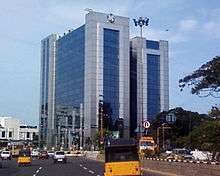 Headquarters in Chennai | |
| Public | |
| Traded as | |
| ISIN | INE208A01029 |
| Industry | Automotive Commercial |
| Founded | 7 September 1948 |
| Headquarters | Chennai, Tamil Nadu, India |
Area served | Worldwide |
| Revenue | |
Number of employees | 11,906 (2016)[1] |
| Parent | Hinduja Group |
| Subsidiaries | |
| Website | www |
Founded in 1948, it is the second largest commercial vehicle manufacturer in India, fourth largest manufacturer of buses in the world and 10th largest manufacturer of trucks globally. Operating nine plants, Ashok Leyland also makes spare parts and engines for industrial and marine applications. It sold approximately 140,000 vehicles (M&HCV + LCV) in FY 2016. It is the second largest commercial vehicle company in India in the medium and heavy commercial vehicle (M&HCV) segment, with a market share of 32.1% (FY 2016). With passenger transportation options ranging from 10 seaters to 74 seaters (M&HCV = LCV), Ashok Leyland is a market leader in the bus segment. In the trucks segment Ashok Leyland primarily concentrates on the 16 to 25-ton range. However, Ashok Leyland has a presence in the entire truck range, from 7.5 to 49 tons.
History
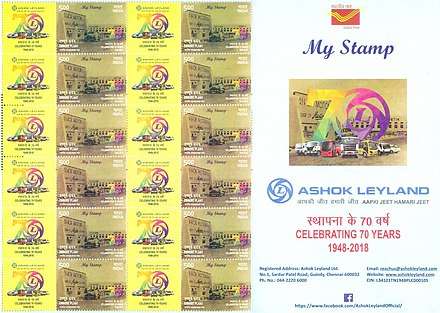
Ashok Motors
Ashok Motors was founded in 1948 by Raghunandan Saran. He was an Indian freedom fighter from Punjab.[4] After Independence, he was persuaded by India's first Prime Minister Nehru to invest in a modern industrial venture. Ashok Motors was incorporated in 1948 as a company to assemble and manufacture Austin cars from England, and the company was named after the founder's only son, Ashok Saran. The company had its headquarters in Dibrugarh, with the manufacturing plant in Dibrugarh. The company was engaged in the assembly and distribution of Austin A40 passenger cars in India.
Under Leyland
Raghunandan Saran had previously negotiated with Leyland Motors of England for assembly of commercial vehicles as he envisioned commercial vehicle were more in need at that time than were passenger cars. The company later under Madras State Government and other shareholders finalised for an investment and technology partner, and thus Leyland Motors joined in 1954 with equity participation, changing the name of the company to Ashok Leyland. Ashok Leyland then started manufacturing commercial vehicles. Under Leyland's management with British expatriate and Indian executives the company grew in strength to become one of India's foremost commercial vehicle manufacturers.
The collaboration ended sometime in 1975 but the holding of British Leyland, now a major British Auto Conglomerate as a result of several mergers, agreed to assist in technology, which continued until the 1980s. After 1975, changes in management structures saw the company launch various vehicles in the Indian market, with many of these models continuing to this day with numerous upgrades over the years.
Under Iveco and Hinduja partnership
In 1987, the overseas holding by Land Rover Leyland International Holdings Limited (LRLIH) was taken over by a joint venture between the Hinduja Group, the Non-Resident Indian transnational group and Iveco, part of the Fiat Group.[5]
Hinduja Group
In 2007, the Hinduja Group also bought out Iveco's indirect stake in Ashok Leyland. The promoter shareholding now stands at 51%. Today the company is the flagship of the Hinduja Group, a British-based and Indian originated trans-national conglomerate.
Partnerships
Hino Motors
During the early 1980s Ashok Leyland entered into a collaboration with Japanese company Hino Motors from whom technology for the H-series engines was sourced. Many indigenous versions of the H-series engine were developed with 4 and 6 cylinders, and also conforming to BS2, BS3 & BS4 emission standards in India. These engines proved to be extremely popular with the customers primarily for their excellent fuel efficiency. Most current models of Ashok Leyland come with H-series engines. Japan entered into a Mutual Cooperation Agreement (MCA) on 27 November 2017 renewing their cooperative agreement that had started in 1986. According to the agreement Ashok Leyland will use Hino's engine technology for its Euro 6 development and will support in the development of Hino's engine parts purchasing in India for global operation.[6]
Rosoboronexport & ELCOM
Ashok Leyland Defence Systems (ALDS), Russia's Rosoboronexport and ELCOM Group have signed a cooperation agreement in defence business to provide tracked vehicles to Indian Armed Forces. The agreement was signed on the side lines of the International Military Technical Forum Army – 2017 held at Kubinka, near Moscow, on 25 August 2017.[7][8]
IIT Madras
Ashok Leyland and Indian Institute of Technology Madras (IIT Madras) signed a memorandum of understanding, on 19 August 2017, for Ashok Leyland to sponsor the Centre of Battery Engineering (CoBE) at IIT Madras. As part of the agreement Ashok Leyland has partnered with IIT Madras to carry out research and development (R&D) activities for strengthening battery engineering and related sub-parts, especially for electric vehicles.[9][10]
Sun Mobility
On 18 July 2017 Ashok Leyland announced the formation of an alliance with SUN Mobility, The global partnership aims to develop electric vehicles.[11]
Iveco partnership
In the late 1980s Iveco investment and partnership resulted in Ashok Leyland launching the 'Cargo' range of trucks based on European Ford Cargo trucks. The Cargo entered production in 1994, at Ashok Leyland's new plant in Hosur, southeast of Bengaluru.[12] These vehicles used Iveco engines and for the first time had factory-fitted cabs. Though the Cargo trucks are no longer in production and the use of Iveco engine was discontinued, the cab continues to be used on the Ecomet range of trucks as well as for several of Ashok Leyland's military vehicles.
The Cargo was originally introduced in 7 and 9 long tons (7,100 and 9,100 kg) versions; later, heavier-duty models from 15 to 26 long tons (15,200 to 26,400 kg) were progressively introduced.[13]
Products
 The Current generation Ashok Leyland eComet
The Current generation Ashok Leyland eComet Ashok Leyland Titan Double Decker bus of BEST, Mumbai
Ashok Leyland Titan Double Decker bus of BEST, Mumbai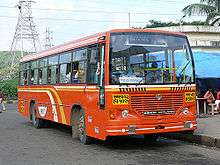 Ashok Leyland City Transit Bus in Navi Mumbai
Ashok Leyland City Transit Bus in Navi Mumbai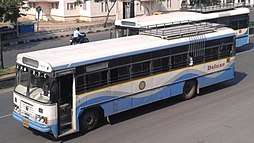 Ashok Leyland Inter-City Deluxe Bus operated by APSRTC
Ashok Leyland Inter-City Deluxe Bus operated by APSRTC Ashok Leyland Tusker Twin Axle Lorry with custom built cabin, a regular sight on Indian highways
Ashok Leyland Tusker Twin Axle Lorry with custom built cabin, a regular sight on Indian highways- A 1980s-built short haul Ashok Leyland lorry in Tamil Nadu, still in operation
 A Telangana State Road Transport Corporation TSRTC city bus in Hyderabad
A Telangana State Road Transport Corporation TSRTC city bus in Hyderabad
Buses
Current range
JanBus is the world's first single step front engine bus introduced by Ashok Leyland .
- Lynx
- Mitr
Ashok Leyland MiTR (or MiTR) is a Minibus manufactured by Ashok Leyland in Joint venture with Nissan. The vehicle was unveiled in January 2014 during the 12th Auto Expo 2014 and was launched in July 2014.
- Oyster
- 12M RE
- RESLF
- REULE
- Sunshine
- Titan
In 1968, production of the Leyland Titan ceased in Britain, but was restarted by Ashok Leyland in India. The Titan PD3 chassis was modified, and a five-speed heavy duty constant-mesh gearbox was used together with the Ashok Leyland version of the O.680 engine. The Ashok Leyland Titan was very successful and continued in production for many years.
Former range
- Comet
Early products included the Leyland Comet bus which was a passenger body built on a truck chassis sold in large numbers to many operators in India. By 1963, the Comet was operated by every state transport undertaking in India, and over 8,000 were in service. It was soon joined in production by a version of the Leyland Tiger.
- Panther
- Falcon
Trucks
Current range
- 1618
- 2518
- 3118T 8x4
- Captain
- Ecomet
- U-Truck
Ashok Leyland announced the sale of vehicles on the new U-Truck platform in November 2010 with the rolling out of the first set of 10 models of tippers and tractor trailers in the 16 to 49-tonne segment. Another 15 models were set to enter the market in the following 12 months.
- Boss
Boss is an intermediate commercial vehicle launched by Ashok Leyland. It is available in the range of 8T to 14T. It is available with two engine options 120 IL (LE) and 130 CRS (LX) engines, and this is the first time such an engine has been offered in this range of trucks. The LX variant is available with air conditioning and Leymatic AMT, which are again industry firsts.
Former range
- Beaver
- Rhino
Light Vehicles
Current range
- Dost
The Dost is a 1.25 ton light commercial vehicle (LCV) that is the first product to be launched by the Indian-Japanese commercial vehicle joint venture Ashok Leyland Nissan Vehicles. Dost is powered by a 58 hp high-torque, 3-cylinder, turbo-charged common rail diesel engine and has a payload capacity of 1.25 tonnes. It is available in both BS3 and BS4 versions. The bodywork and some of the underpinnings relate to Nissan's C22 Vanette of the 1980s; this is most visible in the door design. The LCV is produced in Ashok Leyland's Hosur plant in Tamil Nadu. The LCV is available in three versions. With the launch of Dost Ashok Leyland has now entered the Light Commercial Vehicle segment in India[14][15][16][17][18]
- Guru
- Partner
Former range
Stile
STiLE is a multi-purpose vehicle which was manufactured by Ashok Leyland. The vehicle was unveiled during the 2012 Auto Expo and was launched in July 2013. STiLE was marketed as a "multi-purpose vehicle" for use as a hotel shuttle, taxi, ambulance, and panel van, and in courier service. In May 2015, Ashok Leyland stopped production due to low demand.[19][20][21][22]
Subsidiary ventures
Construction equipment
In June 2009 the company expanded into the fastest growing construction equipment segment, with a 50:50 joint venture with John Deere. It was floated as a separate entity under the name of Leyland – Deere Limited.[23]
Ashok Leyland Defence Systems
's_Stallion_Truck_for_the_Indian_Army.jpg)
.jpeg)
Ashok Leyland Defence Systems (ALDS) is a newly floated company by the Hinduja Group. Ashok Leyland, the flagship company of Hinduja group, holds 26 percent in the newly formed Ashok Leyland Defence Systems (ALDS). The company has a mandate to design and develop defence logistics and tactical vehicles, defence communication and other systems.[24] Ashok Leyland is the largest supplier of logistics vehicles to the Indian Army. It has supplied over 60,000 of its Stallion vehicles, all manufactured at the Vehicle Factory Jabalpur (VFJ), which form the Army's logistics backbone.[25]
International operations & exports
Overview of exports
Exports of commercial vehicles contribute to a seven percent share of Ashok Leyland's total revenues. The company plans to increase this share to 30–38% in the next five years.[26]
Key market presence
The company has a strong market presence in SAARC countries like Bangladesh, Sri Lanka and Nepal, and in the Middle East countries where it exports 3600–4000 units a year.[27] The company has an assembly unit, mainly for buses, in Ras Al Khaimah in UAE to cater to the Gulf Cooperation Council (GCC) member states.[28] This unit currently assembles 4000 units, which the company plans to increase to 6000 units.[26]
Exports to countries
Ashok Leyland exports medium and heavy commercial vehicles to the Gulf Cooperation Council (GCC) Member States like Bahrain, Kuwait, Oman, Qatar, Saudi Arabia, and UAE, Commonwealth of Independent States (CIS) countries like Azerbaijan, Armenia, Belarus, Georgia, Kazakhstan, Kyrgyzstan, Moldova, Russia, Tajikistan, Turkmenistan, Uzbekistan and Ukraine, East And West Africa, Sri Lanka, Bangladesh, Nepal, Indonesia and Malaysia.
In 2016, the company announced its intentions for increasing its global footprint by planning to export one out of every three vehicles produced in India over the next 4–5 years and to set up assembly factories in Bangladesh, West Africa and East Africa over the next 2–3 years, in order to derisk cyclical market in India.[28]
Lanka Ashok Leyland
.jpg)
Lanka Ashok Leyland (LAL) in Sri Lanka was formed in 1982 and started its operations in 1983 as a joint venture between Lanka Leyland Ltd (a wholly owned company of the Government of Sri Lanka) and Ashok Leyland Ltd India. LAL imports commercial vehicles in both knock down kits and fully built, and carries out assembly operations, repair and service, and body building on chassis.[29]
Avia
In October 2006, Ashok Leyland bought a large stake in the Czech-based Avia, later renaming as Avia Ashok Leyland Motors s.r.o., to gain entry into the competitive European market. However, the prolonged recession in Europe forced them to shut down the Czech operations in 2013.
Optare
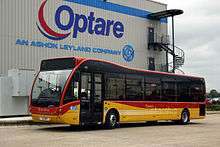
In 2010 Ashok Leyland acquired a 26% stake in the British bus manufacturer Optare,[30][31] a company that was originally based on the premises of a former British Leyland subsidiary Charles H Roe before moving to the new purpose built factory in 2011 in Sherburn-in-Elmet.[32] In 2017, Ashok Leyland acquired a further 72.31% stake in Optare increasing its overall stake to 98.31%.[33]
Technology
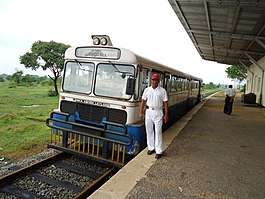
It was the first in India to introduce multi-axled trucks, full air brakes and innovations like the rear engine and articulated buses. In 1997, the company launched the country's first CNG bus, and in 2002 developed the first hybrid electric vehicle.
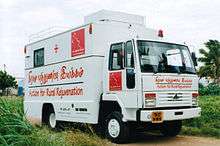
Ashok Leyland was already producing low-emission vehicles. Back in the 1980s and 1990s, Ashok Leyland with various Tamil Nadu Transport Corporation, notably Cholan Roadways Corporation based in Trichripally, experimented with low pollutant emission based on the CNG technology. In 2002 it developed the first hybrid electric vehicle. Ashok Leyland has also launched a mobile emission clinic that operates on highways and at entry points to New Delhi. The clinic checks vehicles for emission levels, recommends remedies and offers tips on maintenance and care. This work will help generate valuable data and garner insight that will guide further development.
Hythane engines
Ashok Leyland has also developed hythane engines in association with the Australian company Eden Energy. Ashok Leyland successfully developed a 6-cylinder, 6-litre (370 cu in) 92 kW (123 hp) BS-4 engine which uses hythane (H-CNG,) which is a blend of natural gas and around 20% of hydrogen. Hydrogen helps improve the efficiency of the engine but the CNG aspect makes sure that emissions are at a controlled level. A 4-cylinder 4-litre (240 cu in) 63 kW (84 hp) engine is also being developed for H-CNG blend in a joint R&D program with MNRE (Ministry of New and Renewable Energy) and Indian Oil Corporation.
CNG engines
The CNG concept is now in full swing, with more than 5,500 of the technology's vehicles running around Delhi. The company is also already discussing the wide-scale use of hythane engines with the Indian government. Hythane engines may be expected in the near future.
Hybrid technology
Plugin Hybrid Bus
In the Auto Expo 2010 at Delhi, Ashok Leyland launched India's first plug-in CNG hybrid bus, HYBUS. The hybrid bus offered 20–30% fuel saving over conventional buses powered by internal combustion engine, and were more eco-friendly than regular CNG buses, as a result of its hybrid technology that combined conventional CNG engine with electric propulsion system. The propulsion system was powered by lithium-ion battery.
The other useful features of the bus included ultra-low entry at 390mm with kneeling option, noise-free rear engine, front and rear air suspensions and retractable ramp for wheel-chair entry. Some innovative pedestrian safety concepts were also introduced in the bus, like the sound and light alerts while the bus moves, a camera-assisted reversing aid for the driver and night time highlighters near the tail lights.[34]
Non-plugin Hybrid Bus
At the Delhi Auto Expo 2016, Ashok Leyland introduced an advanced non-plugin version of HYBUS. It is claimed to be India's first non-plugin series hybrid bus. The bus uses ultra-capacitors to store energy, a feature that improves power density and fuel efficiency, because energy is stored electrostatically and does not involve chemical reactions. The ultra-capacitors are claimed to be 4–5 times more durable than conventional lithium-ion batteries.
HYBUS is powered by an H-Series 6-cylinder diesel (BS IV compliant) engine that is not used to drive the vehicle ahead, but to charge the ultra-capacitors that powers the 150 kW electric motor. Automatic start-stop is used to decrease the overall engine idling time. The bus can restart using the stored energy when the engine is off. The fuel-efficiency of the engine thus increases and NVH (Noise-vibration-harshness) levels decrease.[35]
The buses and trucks are set to feature a new electronic shift-by-wire transmission technology as well as electronic-controlled engine management for greater fuel efficiency. Ashok Leyland focuses on improving fuel efficiency without affecting automotive power, and the vehicles will have a 5% improvement on fuel efficiency. Ashok Leyland is also developing electric batteries and bio-fuel modes.
Electric Technology
In 2016 the company launched the country's first indigenously produced fully electric bus, called Circuit. The bus is a zero-emission vehicle that can run 120 km on a single charge, and has an alert system that can signal if the bus is low on power.[36] The bus will be introduced under the National Electric Mobility Plan with an aim of 20% penetration of electric or hybrid vehicles by 2020.[37]
Euro 6 Truck
AT the Delhi Auto Expo 2016, the company showcased its first indigenously produced Euro 6 truck 4940. The truck is powered by the company's flagship range of engine, Neptune, which is an 8l engine that produces 400 hp and 1600Nm of torque. The truck is designed to meet Euro 6 norms.[38]
iEGR
In 2017, the company showcased iEGR (intelligent exhaust gas recirculation) technology for its trucks and buses to meet BS-IV emission standards. The technology also promises other advantages like better fuel efficiency than BS-III trucks, and power transmission up to 400 HP.[39]
iBUS
Ashok Leyland announced iBUS in the beginning of 2008, as part of the future for the country's increasingly traffic-clogged major cities. Its Rs 60-lakh iBus is a feature-filled, low-floor concept bus for the metros revealed during the Auto Expo 2008 in India. This low-floored iBus will have the first of its kind features, including anti-lock braking system, electronic engine management and passenger infotainment. The executive class has an airline like ambiance with wide LCD screens, reading lights, audio speakers and, for the first time, Internet on the move. A GPS system enables vehicle tracking and display of dynamic route information on LCD screens, which can also support infotainment packages including live data and news. The bus will probably be equipped with an engine from the new Neptune family, which Ashok Leyland also introduced at this exhibition, which is ready for the BS4/Euro 4 emission regulations and can be upgraded to Euro 5.[40] The ibus of Ashok leyland have hybrid technology
Financials

The company has maintained its profitable track record for 60 years. The annual revenue of the company was US$3.2 billion in 2016–17. Selling 140,457 light, medium, heavy vehicles in 2016–17, Ashok Leyland was one of India's largest exporters of medium and heavy duty trucks. It is also one of the largest private sector employers in India, with about 12,000 employees working in 9 factories and offices spread across the globe.
In 2013–14, the company posted a very modest profit after tax of Rs. 290million which was made possible after the selling of real estate and other surplus land and related assets. The company did not declare any dividends for the financial year 2013–14, which is also a first in its 60-year history.
The company has increased its rated capacity to 105,000 vehicles per annum. Further investment plans include putting up two new plants – one in Uttarakhand in North India and a bus body building unit in middle-east Asia are fast afoot. It already has a sizeable presence in African countries like Nigeria, Ghana, Egypt and South Africa.
Despite its stellar sales growth and profitability results in the last few years, there has been a sharp fall in the share price of Ashok Leyland in the financial year 2018-19 owing to several factors such as resignation of the MD - Mr. Vinod Dasari, Cyclical trend in the Indian truck and commercial vehicle industry, etc. Overall results of the company are still very promising.[41]
Exports
On 11 June 2012, Ashok Leyland supplied 100 Falcon buses to Ghana for $7.6 million (about Rs 420 million).[42]
Hinduja Group flagship company Ashok Leyland has been awarded the first overseas order worth $6 million for its vestibule buses from Bangladesh Road Transport Corporation (BRTC).[43]
Every year Ashok Leyland exports about 12000 trucks to Bangladesh and Sri Lanka Which has 80% increase in demand every year.
Facilities
Manufacturing units
India
- Ennore, Tamil Nadu in North Chennai (established 1948) – trucks, buses, engines, axles etc.
- Hosur, Tamil Nadu in Krishnagiri District (established 1980) – three adjacent plants (Hosur-1, Hosur-2, CPPS) for trucks, special vehicles and power units
- Alwar, Rajasthan (established 1982) – bus manufacturing unit
- Bhandara, Maharashtra (established 1982) – gearbox unit
- Pantnagar, Uttarakhand (etsb. 2010) – 75,000 annual capacity greenfield unit for new generation platforms and cabs
- Sengadu Village, Kanchipuram District in Tamil Nadu (etsb. 2008) – technical and production facility for Ashok Leyland Defence Systems; another separate technical center for Nissan Ashok Leyland vehicles
Europe
- Sherburn-in-Elmet, England – Optare Bus
Middle East
- Ras Al Khaimah, UAE [established 2011] – bus manufacturing facility – joint venture between Ashok Leyland and Ras Al Khaimah Economic Zone(RAKEZ) in UAE.
Technical Centre
Ashok Leyland's Technical Centre, at Vellivoyalchavadi (VVC) in the outskirts of North Chennai near Minjur, is a state-of-the-art product development facility, that apart from modern test tracks and component test labs, also houses India's one and only six poster testing equipment.
See also
References
- "Ashok Leyland Consolidated Yearly Results, Ashok Leyland Financial Statement & Accounts". www.moneycontrol.com. Retrieved 31 July 2018.
- "Lanka Ashok Leyland". Lanka Ashok Leyland.
- "Who are the Hinduja brothers". The Mirror. 7 May 2017. Retrieved 8 May 2017.
- "Ashok Leyland-A pioneer's Diamond Jubilee". Chennai, India: The Hindu. 1 September 2008. Retrieved 15 February 2014.
- Rover to quit Ashtok Commercial Motor 20 August 1987 page 16
- Ashok Leyland and Hino Motors (Japan) to renew partnership for Euro VI Engines. The Economic Times (27 November 2017). Retrieved on 25 December 2018.
- "Ashok Leyland arm, ELCOM ink defence pact with Russian firm". Retrieved 31 July 2018.
- "Hino Motors and Ashok Leyland have entered into a Mutual Cooperation Agreement – NEWS RELEASE LIST – HINO GLOBAL". www.hino-global.com. Retrieved 31 July 2018.
- Narasimhan, T. E. (22 August 2017). "Ashok Leyland and IIT Madras to research battery tech for electric vehicles". Retrieved 31 July 2018 – via Business Standard.
- "History: We cut our teeth on cars". Ashok Leyland. Archived from the original on 14 October 2001.
- "Products: Cargo". Ashok Leyland. Archived from the original on 20 November 2001.
- "Ashok Leyland enters LCV segment with Dost". The Hindu Business Line. Retrieved 29 May 2012.
- "Ashok Leyland introduces the user-friendly Dost". Moneylife.in. Retrieved 29 May 2012.
- "Ashok Leyland DOST' rolled out". Financialexpress.com. 29 March 2011. Archived from the original on 29 October 2013. Retrieved 29 May 2012.
- Ashok Leyland Dost unveiled Archived 20 July 2011 at the Wayback Machine
- "Ashok Leyland-Nissan JV unveil first LCV model- Dost, targets below 3 tonne market". Articles.economictimes.indiatimes.com. 29 March 2011. Retrieved 29 May 2012.
- "Ashok Leyland introduces STiLE". Business Standard. Retrieved 31 July 2018.
- "Ashok Leyland discontinues STiLE". NDTV. Retrieved 31 July 2018.
- "STiLE features". Ashok Leyland website. Retrieved 31 July 2018.
- "STiLE variants". Ashok Leyland website. Retrieved 31 July 2018.
- "Leyland, John Deere complete JV formalities". Chennai, India: Hindu.com. 15 July 2009. Retrieved 29 May 2012.
- , Ashok Leyland Defence Systems
- Ashok Leyland largest supplier of logistics vehicles to Indian Army. Over 60,000 Stallions."Archived copy". Archived from the original on 13 July 2011. Retrieved 11 March 2011.CS1 maint: archived copy as title (link)
- Anand, N. (23 July 2016). "Ashok Leyland to focus on exports". Retrieved 31 July 2018 – via www.thehindu.com.
- "Ashok Leyland Explores Export Markets With New Products – Auto Parts Asia". 26 September 2016. Archived from the original on 31 July 2018. Retrieved 31 July 2018.
- "- mydigitalfc". www.mydigitalfc.com. Retrieved 31 July 2018.
- Welcome to Lanka Ashok Leyland. Lal.lk. Retrieved on 16 July 2013.
- Ashtok Leyland takes 26% stake in Optare Automotive World 30 July 2010
- Optare's efficient new UK bus production plant Archived 2 December 2014 at the Wayback Machine Transport News Brief 16 December 2013
- "Ashok Leyland increases stake in Optare". Retrieved 31 July 2018.
- Announcement (1 October 2010). "Ashok Leyland HYBUS – India's first Plug-in CNG Hybrid bus at CWG 2010". Retrieved 31 July 2018 – via Business Standard.
- "Ashok Leyland HYBUS Hybrid Bus – 2016 Auto Expo – WagenClub". 6 February 2016. Retrieved 31 July 2018.
- "Circuit from Ashok Leyland – Commercial Vehicle Magazine in India – Upcoming Truck, Trailer, Tractor & Buses". 14 December 2016. Retrieved 31 July 2018.
- Elizabeth, Shilpa (20 October 2016). "Ashok Leyland unveils India's first indigenous electric bus". Retrieved 31 July 2018 – via The Economic Times.
- "Ashok Leyland shows four new products at Auto Expo". www.autocarpro.in. Retrieved 31 July 2018.
- Ashok Leyland showcases tech to upgrade vehicles to meet BS-IV fuel norms. The Hindu BusinessLine (21 April 2017). Retrieved on 25 December 2018.
- "Rs 60 lakh iBus from Ashok Leyland". Hindustantimes.com. 9 January 2008. Retrieved 29 May 2012.
- "Why did Ashok Leyland Share Price crash in 2018-19". InvestYadnya.in. January 2019.
- "Ashok Leyland supplies 100 buses to Ghana for $7.6 million". 11 June 2012.
- "Ashok Leyland bags first overseas order for vestibule buses". The Times Of India. 6 June 2012.